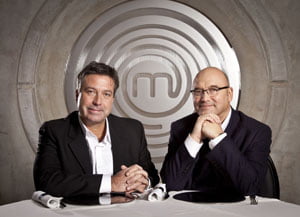Creativity comes first
By Tim Hincks
24-08-2015
Endemol Shine Group’s president argues that indies shouldn’t separate creativity and business, in an excerpt from Tomorrow’s People: Making Cultures for Creativity, a book from UKTV promoting British creativity.
In 1990, Peter Bazalgette interviewed me for a job at his company Bazal. I’d never met Baz before, and we started discussing the sort of programmes that I might produce for him. I enjoyed the meeting very much. In fact, so much that (in a sudden burst of overconfidence) I grandly suggested that there was surely a market for a political show. A political panel show. Or a satirical one. That, I said, was the show that we should do. And Baz replied, “OK, well, you’d better come up with it then.”
At that moment, the penny dropped. I realised that if you want to be involved in the creative side of television then you can’t sit back and wait for shows to magically appear. The creative world is not a dreamy world. In a way it’s actually very, very practical. You need to make things happen. Oh, and you need a very healthy relationship with rejection.
I got the job at Bazal, oddly enough. And I did come up with a political panel show, which I think – though I have no scientific evidence for this – might have been the worst idea ever created in the history of the world. I believe I pitched it to Tim Gardam, who was at that time head of programmes at Channel 4. It was deeply embarrassing, and all completely wrong… but that’s not the point, I’d argue. The point is that I felt like I was up and running.

MasterChef
Twenty-five long years later, the same principles still hold true at Endemol Shine. Under our roof, we’ve got ambitious shows such as Fortitude, Peaky Blinders, The Million Pound Drop, MasterChef, The Island with Bear Grylls and, of course, Big Brother. But all of these huge shows started here in a room somewhere, in which someone bravely ventured, “Wouldn’t it be a good idea if…?” All these shows will have had moments of doubt as they developed and were nurtured. All these shows would have been subjected to constant discussion, and benefited from the occasional happy accident: the right host at the right time, the last-minute twist in the format which proves transformative. But, crucially, the creative teams all made the jump from just ruminating about an idea to turning it into a piece of content, with a beginning, a middle and an end.
Of course, what you don’t want to do is to fall into the trap of becoming a production line. Or even feeling like you’re one. It’s about letting ideas flow gently and gradually – and not worrying, frankly, about the bottom line. Although Endemol (and now Endemol Shine) has always been a very commercially focused organisation, the fact is that we quite simply do not talk about the numbers. Or at least, we don’t make the error – the huge error, the categorical error – of believing it would be helpful, in the creative process, to say how great it would be if we hit our financial targets. I am completely comfortable with the centuries-old tradition of art and commerce working hand in hand. The Beatles wrote some of their best work after they were rich. It’s just that, when it comes down to it, you simply have to put creativity first and really mean it. The numbers, the financial performance, have to come a firm second.
Creative success brings certain challenges though. And for companies that reach a certain size, the key challenge is, I suppose, to not feel big. Do many people really get a kick out of a feeling that they work for a ‘big company’? So you need to accommodate and nurture a thousand different cultures. Because creative people won’t hang around for long if you tell them how to think, or what they should create.
However the bit where scale can be helpful comes in a few shapes and sizes. First, there’s the sense of being in a creative community. Being a creative can be a very, very lonely place, and you get very exposed. Your shows go out, and they’re by no means always liked. Trust me on that. Being part of a team, a family, means that you’ve got friends – a gang of people who’ll dust you down, and who have your best interests at heart.
Secondly, there are also obvious commercial advantages to being in a big group. And that scale is increasingly important, because of the unseemly fight over rights that characterises today’s media landscape. Whether as an organisation, or as an individual creative, it seems to me a fundamental and self-evident truth that you should get a fair share in the ownership of what you create. So it’s a huge advantage to be part of an organisation that will fight your commercial and creative corner.

The Million Pound Drop (aka The Money Drop)
Thirdly, commercial success permits experimentation. If, like Endemol Shine, you’ve got very big brands out there that are working well – though of course that’s an art in itself, and by no means a given – then you can take creative risks with new shows. Many of those new projects won’t make any money whatsoever, but that doesn’t stop the company’s wheels from turning. And you can back your own content – invest in it, and invest in areas like online digital video, or data, which smaller companies frankly don’t have the resources or time to do.
But the key to a company like Endemol Shine, is that the labels and production companies are headed by creative people. And there are also creative people right at the top of the group – at the HQ, if you will. Elsewhere in the industry, it seems to me that a false distinction is often created, between the creative side of the business (on the one hand) and the business side of the business (on the other). I find it surprising how few “creative” organisations are led and run by creative people.
Production companies, in particular, don’t have a licence fee. We don’t have subscription revenue. The only way we can exist is if our ideas take flight. Without those creative ideas, the business is over. So for us at Endemol Shine, there’s no distinction between ‘creative’ and ‘business.’ Creativity is the business.
And what a business. As things stand, UK creative entrepreneurship is in great shape. The UK still punches way above its weight on the global stage. UK talent is in demand like never before. Indeed, I would argue that Endemol Shine’s biggest competitor for off-screen talent isn’t other production businesses in the sector – it’s actually people setting up their own businesses. That’s the key challenge for companies like ours – competing with the start-up culture. It’s a culture that we’ve got to address and that we’ve got to embrace, because those are the people that we need to recruit and retain.
We can make a good start by recognising as we begin every day at the office – you know, around 11.30 on a busy day – that we’re only ever as good as the talented people who want to make a home here. Forget that, and you might as well stay home and watch telly.
Download Tomorrow’s People: Making Cultures for Creativity for free from iTunes, Google Play and UKTV.















.jpg)




























